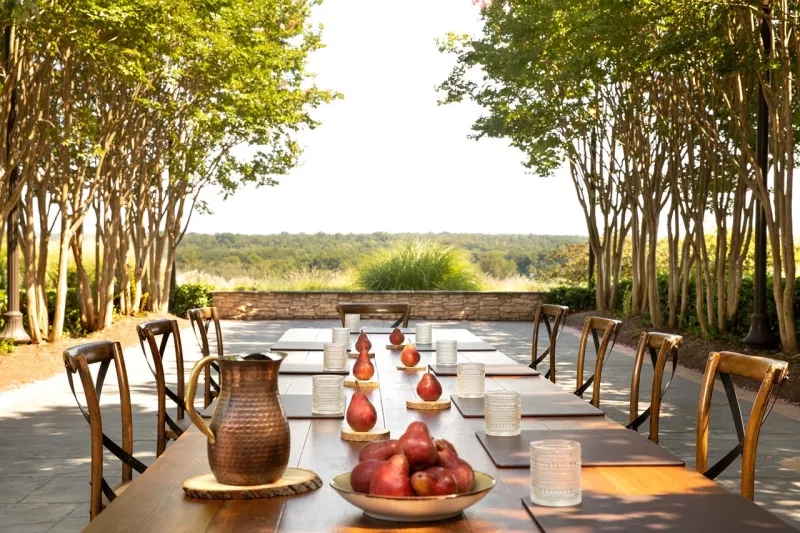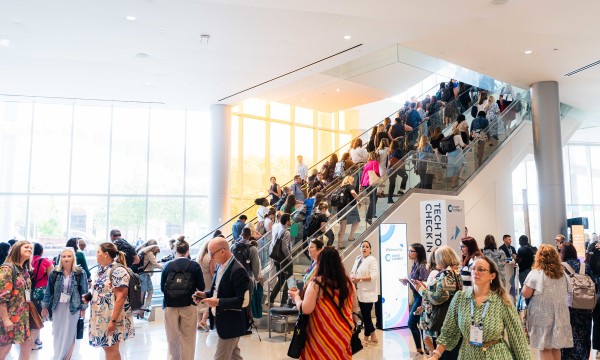
If you're planning a meeting or event in a new location, still searching for the right location for your event, or want to dig deeper into a location’s offerings, you might consider partnering with a DMO, CVB, or DMC. These organizations can help you understand and navigate a destination, recommend local event venues and service providers, and show you everything a location has to offer.
The tourism industry uses three terms for these types of organizations, and while they might run in similar circles, there are important differences between them.
So, what is a DMO vs DMC vs CVB? What do these acronyms mean, and how do they differ from each other? In this blog post, we'll explain the roles and functions of each to help you understand how planners can uplevel their events with the help of these types of organizations.
What Is the Difference Between a DMO, DMC, and CVB?
To start breaking down the differences between DMOs, DMCs, and CVBs, let’s discuss what they each do.
What Does a DMO Do?
A DMO (Destination Marketing Organization) is responsible for promoting a destination to potential visitors and creating a positive image of their location. A DMO is a non-profit organization that works with various stakeholders, such as local businesses, government agencies, and media to help boost tourism and create the best experiences for those who visit and host events.
For planners, this means DMOs are a key to the city! DMOs can provide local expertise to help planners identify and connect with:
- Hotels and accommodations
- Event venues
- Attractions
- Food and beverage operations
- Suppliers and vendors
- Local event sponsors
- Media connections
- Public and private transportation options
- Local regulations and best practices
Once they know what you’re looking for, organizations like these can offer custom recommendations for event programs, such as themed events, local excursions, entertainment, and more based on a planner’s budget, group size, goals, etc. DMOs can even help negotiate contracts, obtain permits, access incentives, and secure publicity.
What Does a CVB Do?
A CVB (Convention and Visitors Bureau) is essentially synonymous with DMOs. CVBs have the same stakeholders, priorities, and functions as DMOs and, in fact, many CVBs have rebranded themselves as DMOs, and the terms are often used interchangeably.
Why use the term DMO vs CVB? Long story short:
- Not every location includes a convention center, so it wouldn’t be accurate to call a tourism organization at those destinations a “convention and visitors” bureau (CVB).
- DMO is a more globally recognized term compared to CVB, which makes DMO preferable.
- The use of the word “bureau” in CVB tends to suggest bureaucratic systems, which isn’t what you want to think of when talking about tourism!
What Does a DMC Do?
A DMC (Destination Management Company) provides paid services and logistical support to visitors and event planners, helping to coordinate transportation, accommodation, activities and tours, and events. A DMC is usually a for-profit company that serves clients while promoting their partners, including travel agencies, corporations, associations, and others.
While DMOs primarily assist in showing planners all their locale has to offer, DMCs are often more involved in helping planners manage all destination-related elements of their events. So, DMCs can offer you many of the same services a DMO can, but (for a price), they’ll also execute some elements of your event.
Here’s a quick guide to help you understand the differences between these organizations:
| Organization | DMO / CVB | DMC |
| Acronym Meaning | Destination Marketing Organization / Convention and Visitors Bureau | Destination Management Company |
| Mission | Promote a destination to attract potential visitors, including working with event planners to evaluate their location as an event destination and recommending local venues, vendors, transportation offerings, and other service providers | Attract potential clients and facilitate destination events by promoting local services, vendors, and venues and offering logistical services to book local tours, transportation, activities, accommodation, and events |
| Fee/Profit Structure | Not-for-profit – no cost to planners | Employed for a fee – DMCs offer different pricing structures, including flat service fees, fees on top of tourism packages, fees charged to partners for promotion, etc. |
In this post, we’re going to focus on what it looks like to work with DMOs (or CVBs), but you can learn more about DMCs here.
What Are the Benefits of a DMO for Event Planners?
Working with a DMO can benefit event planners in many ways. Particularly when planners are unfamiliar with a location or are having trouble choosing the perfect destination for their event, a DMO can help pave the way.
Here are some of the ways DMOs can help event planners:
1. Working with a DMO Is Free!
One of the biggest benefits of working with a DMO as a planner is that it doesn’t cost a cent! With cost savings top of mind for many organizations, this is one area where you don’t have to worry about pinching pennies or breaking the bank.
2. Local Connections and Expertise
A DMO can facilitate connections and lasting partnerships with local stakeholders, such as businesses, government agencies, and media. These connections are so useful, especially if planners have a limited local network of their own.
A DMO can also leverage its network and influence to advocate for planners’ interests, resolve any issues or challenges that may arise, and leverage its marketing and promotion channels to give events a boost.
3. Enhanced Attendee Experiences
A DMO can enhance your attendees’ experience by providing added value and support services, such as welcome bags with maps, guides and brochures, and coupons for local businesses, or VIP amenity baskets with local products.
A DMO can also assist with creating and implementing programs and activities that showcase the unique culture, history, and identity of the destination, such as tours, festivals, and other events happening in tandem with planners’ events.
4. Environmental, Social, and Corporate Governance (ESG) Considerations
While choosing an event destination and executing their events, planners must consider ESG factors like sustainability; diversity, equity, and inclusion (DE&I); accessibility; and corporate governance compliance. A DMO can help identify the best partners based on shared priorities and alignment with corporate policies.
For example, DMOs can help planners implement sustainable practices that benefit the destination, the environment, and the community, by partnering with businesses and venues that aim to reduce waste, energy, and water consumption, use local and organic products, and offset carbon emissions.
DMOs can also help identify voluntourism opportunities, whether as a team building exercise or as an added activity for event attendees to participate in during their free time.
Moreover, planners looking for an event venue that prioritizes accessibility and diversity can get help from a DMO to find viable options with the right resources, infrastructure, and inclusive practices.
5. Innovative Offerings
A DMO can foster creativity and innovation by introducing planners to new products, services, and venues that enhance the quality and diversity of local offerings. The more unique experiences a planner can offer attendees, the better!
Not only does this help planners deliver memorable and engaging experiences, but it also helps differentiate the destination from similar events or previous iterations of an event.
6. Resources to Learn About Your Destination
The more information planners can get about their destination, the better. So, what’s better than having all the details you need handed to you in a curated package?
DMOs have marketing materials for their destination, including professional photos and videos of events and locations, destination brochures and visitor guides, reviews of local businesses, blogs, testimonials, maps, speaker resources, and more.
Not only are these great resources for you and your attendees, but they’re also useful for pitching the location to stakeholders to demonstrate why your destination of choice is the best location for your event!
7. Assistance Planning Itineraries, Transportation, and Logistics
Need help planning an itinerary for a team building event or conference? Want quick and easy details about local transportation options, including parking, buses, shuttles, and more? A DMO can provide you with all these details and help make the logistics portion of your event a breeze.
8. Publicity for Your Events
Who doesn’t love a bit of free publicity? When working with a DMO, they want your event to succeed as much as they want their local businesses to thrive. By plugging your event on their social media and marketing channels, they’re giving your event promotion a boost!
How DMOs Help Hotels, Venues, and Local Businesses
While DMOs can do so much for event planners directly, their involvement with local venues, hotels, and service providers can also be a game changer – not just for these businesses but for planners, too!
Here are a few ways DMOs can help local businesses and, by extension, event planners:
1. Greater Visibility and Simpler Sourcing
At the end of the day, a DMO wants their local community to thrive, and that means boosting business as much as possible. DMOs can increase the visibility and exposure of hotels, venues, and other local businesses by featuring them on their websites, social media channels, and campaign content, and by circulating positive testimonials and referrals within their network of media outlets, travel agents, associations, and other stakeholders.
Of course, a DMO’s recommendations are only as good as the businesses they’re promoting. That means when an event planner comes to a DMO for help sourcing event venues and partners, they aren’t going to refer just anyone; they’ll find the best of the best and make sure those businesses are front and center for planners to choose from and (hopefully) come back to for future events.
2. Increased Collaboration and Communication
A DMO can foster collaboration and cooperation among hotels and venues, by creating and managing platforms and forums to exchange information, ideas, and best practices. A DMO can foster collaboration and cooperation among hotels and venues, helping to align the efforts and interests of local businesses by providing guidance, leadership, and advocacy.
For planners, this means a more connected network of venues and vendors who are comfortable working with each other and can offer certain benefits for working within their preferred network of professionals.
3. Improved Offerings and Experiences
DMOs have their ears to the ground, both in the world of planners and hospitality professionals, making them excellent partners to help local businesses improve their offerings. With access to market intelligence, trends, and reviews of local services, DMOs can help hotels, venues, and service providers improve their performance based on post-event feedback.
This is great for local businesses and planners alike, as planners and event attendees benefit from the improvements DMOs help facilitate!
4. Innovative Achievements
A DMO can foster innovation and creativity among local hotels and venues by encouraging them to adopt new technologies, practices, and solutions that enhance their efficiency, productivity, sustainability, and overall offerings.
DMOs can also showcase the innovative achievements of hotels and venues by featuring them in their awards, publications, and events. The more publicity these innovations receive, the easier it is for planners to find interesting experiences to offer their attendees!
5. An Advocate for All
DMOs have the power to advocate for and represent the interests and needs of planners, attendees, local businesses, and residents. They act as a bridge between all these stakeholders, promoting a common vision and ensuring everyone is satisfied with the events at their destination.
That means that in addition to helping their local hotels, venues, and service providers attract business, they operate as advocates to help planners achieve the best experience for their attendees while considering the needs of residents, who may be affected by events happening near their homes.
By working in partnership with all these stakeholders, DMOs play an integral role in establishing long-term relationships and partnerships within the travel and tourism industry at their destination.
When Should You Work with a DMO?
If you’re on the fence about working with a DMO to help plan and coordinate your events, ask yourself these questions:
- Do I know my event location well enough to find the best venues, experiences, and local recommendations for my attendees?
- Should I try to build lasting partnerships with local venues and businesses so my future events in this location run more smoothly?
- Do I need help ensuring my event is well-received, not only by attendees but also by local businesses and residents?
- Am I interested in more unique, “outside the box” experiences for attendees?
- Do I have niche needs or specific requirements that set my event apart?
- Do I want FREE assistance connecting with local businesses, services, and offerings?
If you answered “yes” to any of these questions, a DMO is a great place to start!
With so many benefits of working with DMOs and absolutely no cost to event planners, there’s really no reason to go it alone. Whether you’re planning events in a familiar location or just exploring a new destination, DMOs have something to offer every planner in any situation.
This blog is written in partnership with Visit Loudoun.









